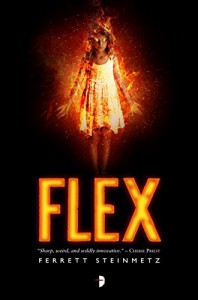

There’s something about urban fantasy. While scifi looks to the future and high fantasy escapes to a different realm, urban fantasy finds enchantment in the everyday and transforms it into pure magic.
And Flex takes it to a new level.
In the world that Steinmetz creates, magic is born of single-minded passion:
“‘Mancers believed so thoroughly in their obsessions that their belief wore a hole through the law of physics.”
As a result, there are gamemancers. Musclemancers. Illustromancers. Collectomancers. Huntomancers. Junkomancers. As one of the characters points out, somewhere out in the world, there are probably even polkamancers. But as harmless as all those reclusive cat-hair-covered felismancers might seem, they’re explosions just waiting for the match. ‘Mancers have the ability to “flex” reality, but reality can only be bent so far before it bends back. And when the “flux”--the reaction to flexing reality too far-- hits, disaster inevitably follows. After Europe melted down in an apocalyptic breach in the folds of reality, America cracked down on its ‘mancers, capturing them and forcing them to join their creepy troop of brain-burned Unimancers.
Now that he’s left the police for the Samaritan insurance company, Paul Tsabo spends his days doing paperwork. Since insurance doesn’t usually cover magic-related injuries, much of his work involves linking disasters to ‘mancers or to sales of the ‘mancy-made drug Flex. But even paperwork has its perils: Paul’s obsession with his holy grail, the “Universal Unified Form,” has turned him into a bureaucromancer. His magic allows him to rearrange schedules, magic cars out of rental agreements, and find almost anyone--as long as he has an identifier to start with. He even has magic desk drawers: one gives him access to every type of form; the other, once he submits the right documentation, allows him to access any paperwork, no matter how secret.
Paul himself, “the guy who turned DMV into an art,” is a likeable character, a nerd who wants to be a superhero without the spandex. He’s adorably uptight and usually doesn’t even realize it:
“Not that Paul ever dressed down. He liked suits. And crisp ties. They were armor for the civilized man. At best, he’d roll up his sleeves, and that only because it looked totally badass.”
At the same time, Paul is complex and flawed; as one of his friends tells him, he tends to think up “good reasons to justify the things you want to do anyway.” Paul’s belief in a predictable, organized, reasonable world is so strong that it is enough to bend reality. What could be more deliciously ironic than that?
(show spoiler)
This is one of those books that just hit me perfectly, and it’s really hard to explain precisely why. I loved the idea of ‘mancy, even though the apostrophe drove me nuts. One of the most interesting parts of magical systems is the cost, and in this case, the consequences of magic are fully explored. The world was a little like a cross between Myke Cole and Kate Griffin; I know that’s a rather bizarre mix, but then so is the book. There are a lot of action-packed moments, many of them involving gamemancy. As a non-gamer, most of the references flew right by me, but I loved that part where they pull out a Portal gun. (The cake is a lie.)
But the book isn’t just about drug-filled magical escapades; it’s also about Paul’s struggles to balance being a mancer and a father:
“That was the stupid thing about parenting: the mundane stuff took up so much of your life, you forgot all this pointed towards the future. You spent your days strapping your kids into backseats, reading them bedtime stories, making them bowls of cereal. That’s what you did as a parent: create routines to make the world seem safer.
If you weren’t paying attention, you’d forget the tasks were not the job.”
It’s also about dealing with pain and loss. It’s about the struggle to not be defined by a disability or deformity, to be a person rather than a victim.
(show spoiler)
I delayed writing this review for a couple of weeks because I just can’t really explain why I enjoyed the book so much. I loved the idea of bureaucromancy, the burgeoning relationship between Paul and the other main character, the humor and the absurdity. I can't wait to find out more about the world. It’s not a perfect fit for everyone, and I’d have a hard time figuring out the right audience, but for those it fits, Flex is pure magic.
Make that pure ‘mancy.
**Note: this review is of an uncorrected advanced reader copy. While the included quotes may not reflect the final phrasing, I believe they speak to the nature of the novel as a whole.**
I received an advanced reader copy ebook through Netgalley from the publisher, Angry Robot Books, in exchange for my honest review. Thank you!

 15
15




